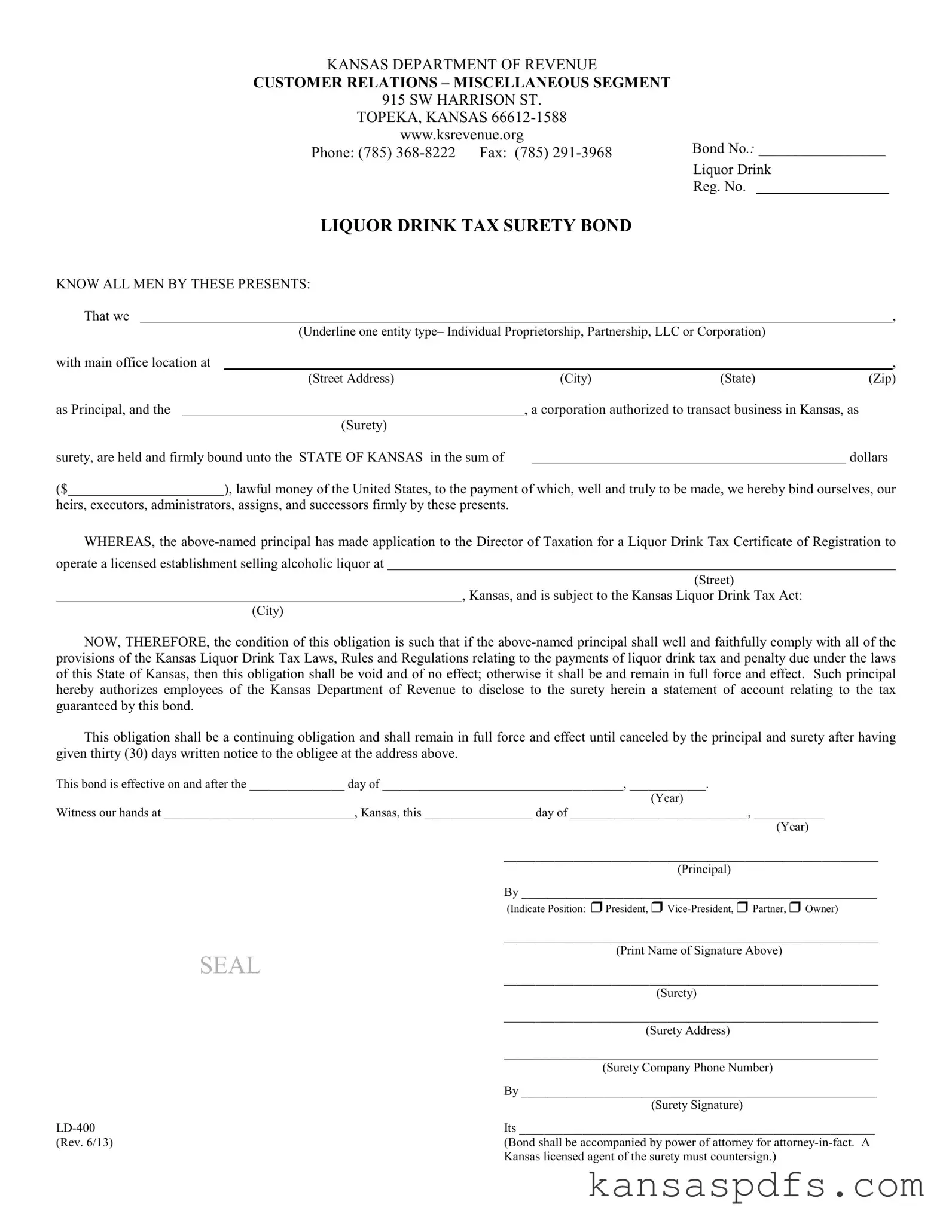KANSAS DEPARTMENT OF REVENUE
CUSTOMER RELATIONS – MISCELLANEOUS SEGMENT
915 SW HARRISON ST.
TOPEKA, KANSAS 66612-1588
www.ksrevenue.org
Phone: (785) 368-8222 |
Fax: (785) 291-3968 |
Bond No.: _________________ |
|
|
|
|
Liquor Drink |
|
|
Reg. No. |
|
LIQUOR DRINK TAX SURETY BOND
KNOW ALL MEN BY THESE PRESENTS:
(Underline one entity type– Individual Proprietorship, Partnership, LLC or Corporation)
with main office location at |
|
|
|
|
|
, |
|
|
|
(Street Address) |
|
(City) |
(State) |
(Zip) |
as Principal, and the |
|
, a corporation authorized to transact business in Kansas, as |
|
|
|
(Surety) |
|
|
|
|
|
surety, are held and firmly bound unto the STATE OF KANSAS in the sum of |
|
|
|
dollars |
($ |
|
|
), lawful money of the United States, to the payment of which, well and truly to be made, we hereby bind ourselves, our |
heirs, executors, administrators, assigns, and successors firmly by these presents. |
|
|
|
|
|
WHEREAS, the above-named principal has made application to the Director of Taxation for a Liquor Drink Tax Certificate of Registration to
operate a licensed establishment selling alcoholic liquor at
(Street)
, Kansas, and is subject to the Kansas Liquor Drink Tax Act:
(City)
NOW, THEREFORE, the condition of this obligation is such that if the above-named principal shall well and faithfully comply with all of the provisions of the Kansas Liquor Drink Tax Laws, Rules and Regulations relating to the payments of liquor drink tax and penalty due under the laws of this State of Kansas, then this obligation shall be void and of no effect; otherwise it shall be and remain in full force and effect. Such principal hereby authorizes employees of the Kansas Department of Revenue to disclose to the surety herein a statement of account relating to the tax guaranteed by this bond.
This obligation shall be a continuing obligation and shall remain in full force and effect until canceled by the principal and surety after having given thirty (30) days written notice to the obligee at the address above.
This bond is effective on and after the _______________ day of ______________________________________, ____________.
|
(Year) |
Witness our hands at ______________________________, Kansas, this _________________ day of ____________________________, ___________ |
|
(Year) |
|
___________________________________________________________ |
|
(Principal) |
|
By ________________________________________________________ |
|
(Indicate Position: r President, r Vice-President, r Partner, r Owner) |
|
___________________________________________________________ |
|
(Print Name of Signature Above) |
|
SEAL |
|
___________________________________________________________ |
|
(Surety) |
|
___________________________________________________________ |
|
(Surety Address) |
|
___________________________________________________________ |
|
(Surety Company Phone Number) |
|
By ________________________________________________________ |
|
(Surety Signature) |
LD-400 |
Its ________________________________________________________ |
(Rev. 6/13) |
(Bond shall be accompanied by power of attorney for attorney-in-fact. A |
|
Kansas licensed agent of the surety must countersign.) |
LD-400 Liquor Drink Tax Surety Bond
(For Drinking Establishments, Class A Clubs, Class B Clubs, Caterers, Public Venues, Hotels, or other On-Premise Licensees)
PLEASE READ BEFORE COMPLETING THIS BOND FORM!
Bond Instructions:
You must complete the most current version of Form LD-400, Liquor Drink Surety Bond. The most current form can be found on our web site: www.ksrevenue.org
All fields on this form must be completed, except for the Liquor Drink Reg. No. field.
This bond must contain a bond number.
Line 1 of the bond must contain the legal name of the entity applying for or holding a Kansas liquor license and must match exactly the entity name listed on the liquor tax application.
The location address on this bond must match exactly the location address on the liquor application. This cannot be a PO Box.
The effective date is the date liquor drink tax coverage under this surety bond begins.
Signature lines:
O“Principal” is the entity being covered under this surety bond.
OAn owner or officer must sign this bond and mark the box indicating their position.
OThe owner/officer must print their name below the signature line.
O“Surety” is the name of the surety company providing the bond coverage.
OA complete mailing address of the surety company must be provided, along with a telephone number.
OA signature of an authorized attorney-in-fact is required. The bond must be accompanied by a power of attorney for the attorney-in-fact. A Kansas licensed agent of the surety must countersign.
OThe bond and power-of-attorney form must contain a seal.
Failure to complete the LD-400 properly will result in an invalid bond. The bond will be voided and kept in the customers file.
Original bonds cannot be returned.
Questions regarding this form should be directed to the Division of Taxation, Miscellaneous Tax Segment, at (785) 368-8222, option 5, then option 4.
Submit this form to:
Miscellaneous Tax
Kansas Department of Revenue
915 SW Harrison St.
Topeka, KS 66612-1588


